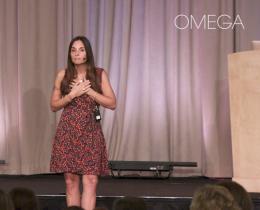Jelalluddin Rumi wrote poems so alive and clear that even today—eight centuries later—they shimmer with freshness.
Rumi often speaks of the “Open Secret.” He says that each one of us is trying to hide a secret—not a big, bad secret, but a more subtle and pervasive one.
Open Secret
Learn the alchemy
true human beings know.
The moment you accept
what troubles you've been given,
the door will open.
—Rumi
It’s the kind of secret that people in the streets of Istanbul kept from each other in the 13th century, when Rumi was writing his poetry. And it’s the same kind of secret that you and I keep from each other today in the 21st century.
You meet an old acquaintance, and she asks, “How are you?” You say, “Fine!”
She asks, “How are the kids?” You say, “Oh, they’re great.” “The job?” “Just fine. I’ve been there five years now.”
Then, you ask that person, “How are you?” She says, “Fine!” You ask, “Your new house?” “I love it.” “The new town?” “We’re all settling in.”
It’s a perfectly innocent exchange of ordinary banter; each one of us has a similar kind every day. But it is probably not an accurate representation of our actual lives.
We don’t want to say that one of the kids is failing in school, or that our work often feels meaningless, or that the move to the new town may have been a colossal mistake.
It’s almost as if we are embarrassed by our most human traits. We tell ourselves that we don’t have time to go into the gory details with everyone we meet; we don’t know each other well enough; we don’t want to appear sad, or confused, or weak, or self-absorbed. Better to keep under wraps our neurotic and nutty sides (not to mention our darker urges and shameful desires.)
Why wallow publicly in the underbelly of our day-to-day stuff? Why wave the dirty laundry about, when all she asked was, “How are you?”
Rumi says that when we hide the secret underbelly from each other, then both people go away wondering, “How come she has it all together? How come her marriage/job/town/family works so well? What’s wrong with me?”
We feel vaguely diminished from this ordinary interaction, and from hundreds of similar interactions we have from month to month and year to year.
When we don’t share the secret ache in our hearts—the normal bewilderment of being human—it turns into something else. Our pain, and fear, and longing, in the absence of company, become alienation, and envy, and competition.
The irony of hiding the dark side of our humanness is that our secret is not really a secret at all. How can it be when we’re all safeguarding the very same story?
That’s why Rumi calls it an Open Secret. It’s almost a joke—a laughable admission that each one of us has a shadow self—a bumbling, bad-tempered twin. Big surprise!
Just like you, I can be a jerk sometimes. I do unkind, cowardly things, harbor unmerciful thoughts, and mope around when I should be doing something constructive. Just like you, I wonder if life has meaning; I worry and fret over things I can’t control; and I often feel overcome with a longing for something that I cannot even name.
For all of my strengths and gifts, I am also a vulnerable and insecure person, in need of connection and reassurance. This is the secret I try to keep from you, and you from me, and in doing so, we do each other a grave disservice.
Rumi tells us that moment we accept what troubles we’ve been given, the door will open.
Sounds easy, sounds attractive, but it is difficult, and most of us pound on the door to freedom and happiness with every manipulative ploy save the one that actually works.
If you’re interested in the door to the heavens opening, start with the door to your own secret self. See what happens when you offer to another a glimpse of who you really are. Start slowly. Without getting dramatic, share the simple dignity of yourself in each moment—your triumphs and your failures, your satisfaction and your sorrow.
Face your embarrassment at being human, and you’ll uncover a deep well of passion and compassion. It’s a great power, your Open Secret.
When your heart is undefended you make it safe for whomever you meet to put down his burden of hiding, and then you both can walk through the open door.



